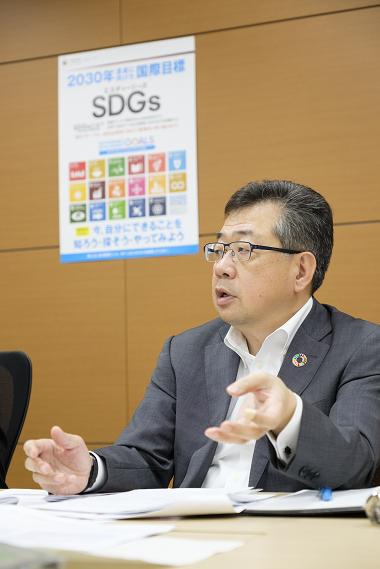
In April 2017, we established Responsible Investment Office and appointed ESG specialists to strengthen our organization. Back in 1999, before environment, society, and governance (ESG) was even a concept, we launched Sompo Japan Green Open fund (nicknamed Buna no Mori), a forerunner of the SRI fund. This fund is now in its 20th year. Few funds can boast of having such long life and we will consider using this data in the future.
As part of our governance system, we have established a Customer First Committee to reflect external input in our management. We have also established a Responsible Investment Committee to promote responsible investment initiatives within the Company. Such efforts have improved investors’ views on our initiatives, particularly among international investors, and I believe that our activities are partly responsible for solving social issues.
Kawakita: Thank you very much. Is the role of the Responsible Investment Committee to monitor performance or to obtain prior approval for the exercising of voting rights?
Nakao: Instantaneous decisions are required for managing investments. The Responsible Investment Committee plays a key role in providing guidance to employees on how to make the correct investment decisions. The Committee thoroughly discusses and decides our initiative policies, and employees make decisions based on these policies.
Kawakita: In other words, the Responsible Investment Committee provides guidelines and monitors activities through reports aligned with the guidelines.
Nakao: That’s correct. The Responsible Investment Committee establishes guidelines for investment decisions, and employees comply with such guidelines. The state of initiatives is then reported to the Customer First Committee to ensure further transparency.
Kawakita: Over the past few years, ESG investing has finally started to attract the attention of society. As a company with over 20 years of experience managing SRI products, I would like to know if there are any aspects of your investment activities that have evolved over time.
Nakao: One significant recent change is the Climate Action 100+*2 movement, a global collective engagement initiative that we have signed onto. Engagement through the cooperation of the international community is said to be an effective means of tackling climate change and other ESG issues that affect the whole world. As activities start in earnest, we play the role of lead investor in engagement with a Japanese company, representing investment companies around the world.
Kojima: It is extremely important to note here that by working together to tackle global initiatives we can develop individual actions into collective power and achieve better results.
Nakao: Engagement used to be thought of as being unilateral requests by investors to companies. Recently more and more companies are starting to recognize that engagement is a means of creating value. As a result, I am starting to sense a positive trend that welcomes engagement.
*2First announced at a general meeting of the Principles for Responsible Investment (PRI) in 2017 and launched in December 2017 at the One Planet Summit, the initiative aims for a five-year collective engagement to reduce greenhouse gas emissions. SAM signed on in January 2018, and is working to reduce greenhouse gas emissions in cooperation with participating organizations in Japan and overseas.